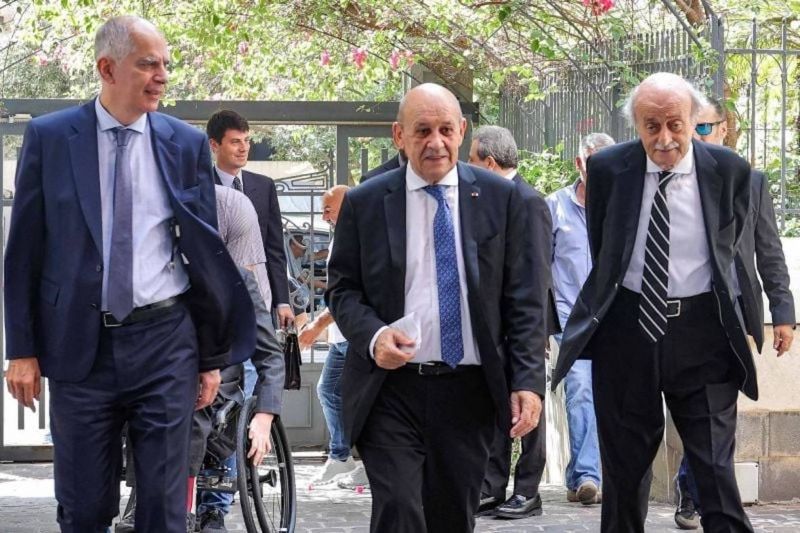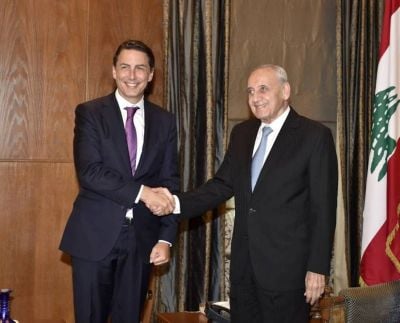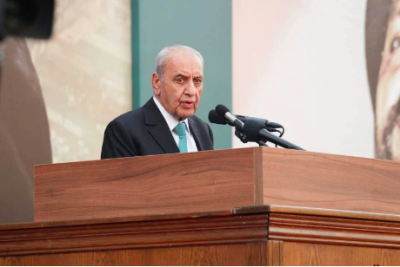
Former president of the Progressive Socialist Party, Walid Joumblatt welcomed French envoy Jean-Yves Le Drian at his Clemenceau residence Wednesday. (Credit: Anwar Amro/AFP)
“The status quo is unbearable.” During his second day visit in Beirut, Jean-Yves Le Drian made it clear to his Lebanese interlocutors that the situation was serious and that, one year after the start of the presidential deadline, it was time to move upstream.
The French envoy is still coming up against the intransigence of the opposition, however, which opposes any dialogue-based initiative, whether proposed by France or by Parliament Speaker Nabih Berri, arguing that the election of the president needs to take place in Parliament, in accordance with the constitution.
Faced with this standoff, the French presidential envoy is said to have pulled out a new card: an open electoral session in Parliament after the withdrawal of the two candidates.
Jean-Yves Le Drian as mediator?
Le Drian began yesterday’s marathon in Beirut’s southern suburbs, where he met with Mohammad Raad, the head of Hezbollah’s parliamentary bloc.
“The diplomat clearly expressed his support for the initiative of Parliament Speaker Nabih Berri,” said Hezbollah spokesman Mohammad Afif Naboulsi.
Indeed, as soon as he arrived in Beirut on Tuesday, he made it clear that he supported Berri’s initiative to break the deadlock, namely to hold a seven-day dialogue followed by, in Berri’s words “open and successive electoral sessions.”
The latter is said to have assured Le Drian that he would convene one open election session, not several, where rounds would follow one another until a president was elected.
The French diplomat considered that this is “the beginning of a solution” and set about trying to convince the opposition to give in. The first to show openness to this approach was the former president of the Progressive Socialist Party (PSP), Walid Joumblatt, who after his one-on-one meeting with the former French minister said that he is “with the vision of Berri and Le Drian.” He also criticized “the Lebanese Forces’ divergent vision.”
“Some parties in Lebanon do not want a solution,” he said.
Indeed, the opposition does not want to hear talk of dialogue, arguing that the constitutional process must be strictly abided to in electing the next president.
The LF is becoming increasingly intransigent.
“It is about time to elect the president of the republic, not to waste time on dialogue,” said LF leader Samir Geagea, after his meeting with the French envoy.
“We have expressed to Jean-Yves Le Drian that we hold to the constitution and to democracy,” Change Forces MP Ibrahim Mneimneh told L’Orient-Le Jour.
As a result, the French envoy is said to be looking for a dialogue format that would be acceptable to all.
“Without going into details, he put forward ideas and made suggestions to reach a format that would be suitable to everyone, said MP Nada Boustani (Free Patriotic Movement (FPM)/ Kesrouan), who took part in Gebran Bassil’s meeting with Le Drian on Tuesday.
“We proposed that Jean-Yves Le Drian play the role of mediator between the various parties,” Renewal Bloc MP Michel Moawad told L’Orient-Le Jour. “The aim is not to institutionalize dialogue at the expense of the constitution, while maintaining contact among the various Lebanese groups.”
Neither Frangieh nor Azour?
In a bid to break the deadlock, the French envoy has proposed a new formula, anonymous sources told L’Orient-Le Jour.
During his meetings with opposition MPs, Le Drian reportedly stated that in order to move forward, both camps would have to withdraw their respective candidates: March 8 candidate, Marada leader Sleiman Frangieh, and opposition and FPM candidate, former minister Jihad Azour. Once this stage is complete, an open electoral session would be convened, at which both camps will undertake not maintain quorum, and the session would only be adjourned once a candidate has been elected.
The French embassy in Beirut did not respond to L’Orient-Le Jour’s request for comment.
“We have already taken a step toward the opposing camp by withdrawing our first candidate, Michel Moawad,” said Kataeb Leader Sami Gemayel, following his meeting with the diplomat. “Now it’s time for Hezbollah to meet us halfway.”
“The French envoy told us that it will be difficult for one of the two candidates in the running to gain access to Baabda,” said Naboulsi. “but he did not ask us to withdraw our candidate,”
Le Drian might be turning a new page in his mission. He has informed his hosts that his fourth visit could come at the end of September.
This would follow the Sept. 18-19 UN General Assembly meeting in New York, when the Group of Five (France, United States, Saudi Arabia, Qatar and Egypt) is due to hold a long-awaited meeting on Lebanon.
“Something is changing in the dossier,” LF Spokesperson, Charles Jabbour, told L’Orient-Le Jour. “There is a kind of international pressure for the election of a president.”Jabbour indicated that the Arab countries support the election of a president not affiliated with either camp.
This may be the reason that, after his exchange with the French envoy, Geagea reiterated that his party will not oppose the election of Lebanon’s army chief Joseph Aoun, favorited by the international community and the Qataris, who are expected in Beirut shortly.
This story first ran in French in L’Orient-Le Jour, translated by Joelle Khoury.

